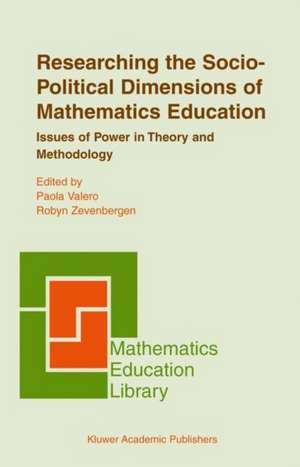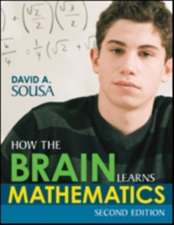Researching the Socio-Political Dimensions of Mathematics Education: Issues of Power in Theory and Methodology: Mathematics Education Library, cartea 35
Editat de Paola Valero, Robyn Zevenbergenen Limba Engleză Hardback – 25 aug 2004
| Toate formatele și edițiile | Preț | Express |
|---|---|---|
| Paperback (1) | 634.79 lei 6-8 săpt. | |
| Springer Us – 8 dec 2010 | 634.79 lei 6-8 săpt. | |
| Hardback (1) | 641.16 lei 6-8 săpt. | |
| Springer Us – 25 aug 2004 | 641.16 lei 6-8 săpt. |
Din seria Mathematics Education Library
-
 Preț: 389.70 lei
Preț: 389.70 lei - 15%
 Preț: 645.96 lei
Preț: 645.96 lei - 18%
 Preț: 742.97 lei
Preț: 742.97 lei - 18%
 Preț: 1394.84 lei
Preț: 1394.84 lei - 18%
 Preț: 942.10 lei
Preț: 942.10 lei - 18%
 Preț: 1544.80 lei
Preț: 1544.80 lei - 15%
 Preț: 652.49 lei
Preț: 652.49 lei - 18%
 Preț: 1325.82 lei
Preț: 1325.82 lei - 18%
 Preț: 1225.48 lei
Preț: 1225.48 lei - 15%
 Preț: 643.34 lei
Preț: 643.34 lei - 18%
 Preț: 1221.07 lei
Preț: 1221.07 lei - 18%
 Preț: 952.89 lei
Preț: 952.89 lei - 18%
 Preț: 950.52 lei
Preț: 950.52 lei - 24%
 Preț: 1445.43 lei
Preț: 1445.43 lei - 18%
 Preț: 1224.54 lei
Preț: 1224.54 lei - 15%
 Preț: 651.19 lei
Preț: 651.19 lei -
 Preț: 391.61 lei
Preț: 391.61 lei - 18%
 Preț: 948.16 lei
Preț: 948.16 lei - 18%
 Preț: 944.19 lei
Preț: 944.19 lei - 18%
 Preț: 1380.95 lei
Preț: 1380.95 lei - 18%
 Preț: 947.85 lei
Preț: 947.85 lei - 18%
 Preț: 948.61 lei
Preț: 948.61 lei - 15%
 Preț: 635.31 lei
Preț: 635.31 lei - 15%
 Preț: 644.63 lei
Preț: 644.63 lei - 15%
 Preț: 646.43 lei
Preț: 646.43 lei - 15%
 Preț: 647.59 lei
Preț: 647.59 lei
Preț: 641.16 lei
Preț vechi: 754.31 lei
-15% Nou
Puncte Express: 962
Preț estimativ în valută:
122.70€ • 133.23$ • 103.07£
122.70€ • 133.23$ • 103.07£
Carte tipărită la comandă
Livrare economică 22 aprilie-06 mai
Preluare comenzi: 021 569.72.76
Specificații
ISBN-13: 9781402079061
ISBN-10: 1402079060
Pagini: 300
Ilustrații: XIV, 280 p.
Dimensiuni: 155 x 235 x 22 mm
Greutate: 0.59 kg
Ediția:2004
Editura: Springer Us
Colecția Springer
Seria Mathematics Education Library
Locul publicării:New York, NY, United States
ISBN-10: 1402079060
Pagini: 300
Ilustrații: XIV, 280 p.
Dimensiuni: 155 x 235 x 22 mm
Greutate: 0.59 kg
Ediția:2004
Editura: Springer Us
Colecția Springer
Seria Mathematics Education Library
Locul publicării:New York, NY, United States
Public țintă
ResearchCuprins
Setting the Scene of this Book.- Socio-political Perspectives on Mathematics Education.- First Dialogic Unit: Challenging Traditional Research Areas from Socio-political Perspectives.- The Socio-political Context of the Mathematics Classroom.- Assessment, Learning and Identity.- Second Dialogic Unit: Finding Alternative Theoretical Tools.- Postmodernity and Social Research in Mathematics Education.- Problematising Culture and Discourse for Mathematics Education Research.- Third Dialogic Unit: Researching in Conflictive situations.- Dichotomies, Complementarities and Tensions.- Lessons from Research with a Social Movement.- Fourth Dialogic Unit: Addressing the Researcher’s Positioning.- Researching the School Mathematics Culture of ‘Others’.- The Fly on the Edge of the Porridge Bowl.- Fifth Dialogic Unit: Adopting Critical Approaches in Research Methodology.- Understanding for Changing and Changing for Understanding.- Research Methodology and Critical Mathematics Education.- Methodological Challenges for Mathematics Education Research from a Critical Perspective.- Epilogoue: Talking Back to Mathematics Education Research.- School Subjects, the Politics of Knowledge, and the Projects of Intellectuals in Change.
Textul de pe ultima copertă
This book examines mathematics education research from socio-political perspectives. It is organized in dialogic units which examine issues such as the critique of existing research results based on the adoption of socio-political approaches; the implications of alternative theoretical tools in researching mathematics education; the tensions emerging while conducting research in highly conflictive environments; the researchers’ positioning with respect to research participants; and the adoption of socio-political methodological frameworks. As a whole, the book serves to illuminate what it means to say that power is a central constituent of mathematics education practices and research.
This book will be of interest to researchers in mathematics education and general education as well as to graduate students taking courses on mathematics education research.
This book will be of interest to researchers in mathematics education and general education as well as to graduate students taking courses on mathematics education research.
Caracteristici
Organized in dialogic units which examine issues such as the critique of existing research results based on the adoption of socio-political approaches; the implications of alternative theoretical tools in researching mathematics education; the tensions emerging while doing research in highly conflictive environments; the researchers' positioning with respect to research participants; and the adoption of socio-political methodological frameworks. As a whole, the book provides illumination on what it means to say that power is a central constituent of mathematics education practices and research





